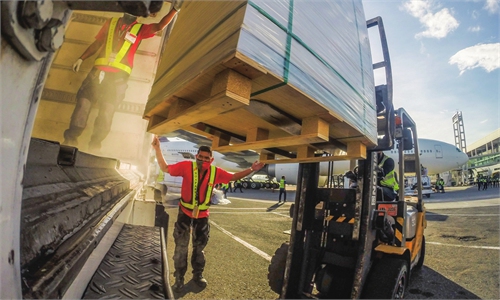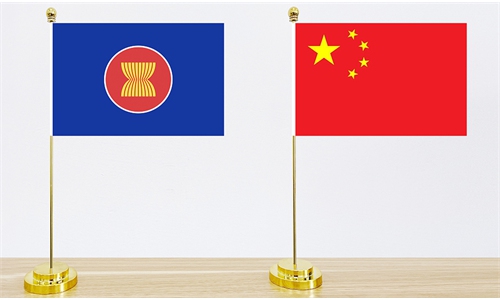US, Philippine Amboys launch inforwar against good Philippine-China relations: Philippine scholar

Illustration: Chen Xia/GT
Editor's Note:The South China Sea issue is one of the most important topics in China-Philippines relations, but there is always noise when the two countries are working to meet each other halfway on the issue. When some manageable frictions took place between the two countries recently, Western media didn't miss the opportunity to hype the issue up. As elections approach in the Philippines, are there any connections between the recent frictions and the upcoming elections? Will the current China policy continue in the Philippines after next year's elections? How will Manila deal with Washington's wooing and pressure? Philippine scholar Herman Tiu Laurel (Laurel), a columnist of the Filipino newspaper Pwersa, shared his views with the Global Times (GT) via email.
GT: There have recently been frictions between China and the Philippines near the Ren'ai Jiao, or Ayungin shoal as it is called by Manila. Philippine President Rodrigo Duterte expressed his dissatisfaction over the incident, and his remarks were viewed by local media as "unusually strong" against China. As elections approach in the Philippines, are there any connections between the frictions near the shoal and the upcoming elections? Every time when there is an incident like this, the Western media will spare no efforts hyping it up. Why?
Laurel: Duterte's statement on the reported incident was aimed at diminishing any blame that would expectedly come from the propaganda campaign of opposition and anti-Duterte political elements. The negative statement Duterte included in his speech for the Special Summit to Commemorate the 30th Anniversary of China-ASEAN Dialogue Relations consisted of one paragraph below a much more substantial praise for the host country and its leader.
It is my suspicion, which I have written about in several articles and columns that were already published, that the Ayungin "water cannon" incident was a deliberate provocation or bait designed to invite the use of the water cannons on the two supply boats to the BRP Sierra Madre to bring to the media and political "echo chamber" and blow up the incident into national and international sensational news. I have called for an investigation of the incident in support of some congressional calls for the same, to put under oath all parties and ask for the whole truth so that future incidents such as this would be avoided especially if proven it was a deliberate provocation.
I wrote an article published in the popular internet news site SovereignPH.com entitled "Supply Boats Baiting Water Cannons Won't Stop China-Backed ASEAN Post-Pandemic" to highlight my view that the latest incident at Ayungin shoal was deliberate and timed for the big event of the week - the 30th anniversary meeting of the China-ASEAN Dialogue that would feature the speeches of heads of state including President Duterte and President Xi Jinping. The intention of the provocative incident is to disrupt the China-ASEAN event, but also provide domestic Philippine interests of the pro-US elements a propaganda and emotional support for the ongoing talks and push for the expansion of the Mutual Defense Treaty and additional facilities for existing US bases facilities based on the Enhanced Defense Cooperation Agreement (EDCA).
The following are the factors that support my suspicions: First, the supposed delivery of the supplies was made during a night when it was pitch dark at sea, which is totally irregular as night deliveries at sea are not only more difficult but immensely more dangerous - and suspicious; Second, the supply boats were so thoroughly covered with tarpaulin or canvass that its cargo and crew were not visible to observation far or near hence raising security concerns. That it was in the deep of night is evidenced from the video scenes shot from the supply boat, while the report of the coverings came from media and other sources that refuse to be identified and supported by published articles of other journalists like me.
GT: You have said in your column that "working with China and the Chinese pays off for the Philippines and the Filipinos" and Filipinos should absorb strengthen from China's development. What is the overall attitude from within the Philippines toward China and what factors have affected it? Will the forces that shape those attitudes therefore affect the outcome of next year's elections?
Laurel: Since President Duterte launched his implementation of the independent foreign policy of the Philippine Constitution in 2016 as soon as he assumed office, the steady stream of economic boom from opening up better relations with China has been witnessed by the Filipino people and has had its positive impact. The $25 billion package of economic and financial assistance signed between President Xi and President Duterte is being delivered and observed and tangibly felt by the Filipino people as commuters begin to use donated bridges, irrigation from China-funded water projects, more power and telecom services options from PPHL-China joint venture companies.
The number of Chinese tourists rose from 490,000 in 2015 to over 1.7 million in 2019, and the market was set to grow even more until the COVID-19 pandemic came. When the COVID-19 crisis struck the Philippines it was China that donated the first batch of 600,000 doses of Sinovac that allowed the Duterte government to roll out the massive vaccination campaign as scheduled on March 1, 2020. China's vaccine deliveries as of November 19, 2021 reach around 54 million doses and constitute almost half of all eight vaccine brands being used. Besides the vaccines there are the hundreds of millions worth of essential life-saving supplies and equipment donations for COVID-19 patients that had been arriving from China since day one of the crisis, from mask to ventilator machines.
We can look at some of the reliable surveys that show the vastly improving view and opinion of Filipinos looking at the Philippines' huge neighbor China. The Publicus survey of July 2021 showed the data on the question of whether China is "a likely friend" or "likely enemy" of the Philippines. The affirmative answer is to the "likely friend" was 15.1 percent and "likely enemy" was 14.4 percent while a vast majority of 53 percent answered yes to "China could be a friend or enemy of the Philippines" keeping options open and not closed to China. That is a world of difference from 2016 when the SWS survey found 55 percent of Filipinos have "little trust" in China.
This positive change in attitude of Filipinos on China already reflects in the massive support shown to the presidential candidates identified with the "friend of China" legacies from president Ferdinand E. Marcos to son Bongbong Marcos now running and leading in the 2022 Philippine presidential race and President Duterte to Sara Duterte running for the vice presidency on the ticket of Bongbong Marcos. The rivals to the Marcos-Duterte tandem in this election have tried to use the anti-China meme to bolster their own campaigns but to no avail.
GT: Since Duterte took office, relations between the Philippines and China have stayed on the track of cooperation in spite of some disputes. Duterte insisted, "We will not close our doors on diplomacy… Because that is how disputes are settled, and never by force." Will such policies of Duterte be continued in the future?
Laurel: Diplomacy will be the only means which any succeeding president of the Philippines will rely on now and into the future, even a hostile president and government so long as they are rational. There are too many unacceptable consequences in taking the alternative route of the use of force which is beyond the means of the country in any scenario anyway.
A serious and extended conflict mode of any hypothetical Philippine government with China also would result in isolation from the rest of ASEAN which is locked into a warm embrace with its top trading partner China, and redound to economic disaster for the country which is also reliant on productive relations with the top buyer and soon-to-be top tourism market China. Any Philippine government that would go into a full conflict mode with China will sooner or later fail and fall, and the traditional backer of the anti-China political elements, the US, is unlikely to be able to sustain their support over the long run. The ultimate variable in Philippine politics is the weight of US influence over the country, but it is waning speedily at this time anyway.
The reality in the current elections is, however, that of electoral choices friendly to China topping the field of presidential candidates, that is to say, Bongbong Marcos in particular with running mate Sara Duterte who are likely destined to be the majority president and vice president if present trends continue. It is pointless to speculate further at this point until major changes in the surveys are seen, as the lead of the Marcos-Duterte team is too large at the moment.
GT: The Philippines is an important military partner of the US in the region. With the Philippine elections approaching, the US is bound to maintain and increase its involvement in the South China Sea issue. How will Manila deal with Washington's wooing and pressure, especially after the elections?
Laurel: The Philippines today compared to a few decades ago is actually much freer from US military influence and the US is trying with great effort to retain its influence with collaboration from its residual but dwindling though still formidable army of what is colloquially called the "Amboys" or American Boys. These individuals are in the political, military, academic and media community in the Philippines whose number runs into a thousand significant individuals under direct payroll of the US. They include members of the academe and media retained as fellows of the American funded "think tanks," those funded by the National Endowment for Democracy (NED) or Omidyar, for example, and politicians and military brass with various links to the US political-economic establishment.
The present and future governments of the Philippines will continue to be in a struggle to maintain the independent foreign policy and the pivot to China against the regression to the US-dependent practice of a smaller and smaller segment of the government, political, academic and pro-American or Amboy community. This struggle will continue so long as the Amboy elements control the legislative houses of Congress and the mainstream media, and the US maintains its direct influence at the highest levels of the military.
GT: The South China Sea issue is one of the most important topics in China-Philippines relations, but there is always noise when the two countries are working to meet each other halfway on the issue. China-Philippine cooperation is in the interests of the two peoples. How can the continuation of this beneficial relationship be ensured?
Laurel: There is a regularity in what I call the IWOs (Information War Operations) of the Americans with their counterparts in the Philippines, namely, the Amboys, the timing of which, from my experience over the years, is about every three months. Most of these operations are planned and initiated at the Asia Maritime Institute (AMTI) and passed through the echo chamber of the Albert Del Rosario Institute (ADRI) and Stratbase (their think tank) and then on to the mainstream media. The objective of these operations is to sustain negative propaganda against good Philippine-China relations, drown out good news in Philippine-China projects, talks and activities, and maintain pressure on the governments' friendly attitude toward China.
The main instrument of these IWOs is the Philippine mainstream media which is almost completely dominating the information milieu of the people. The millions of audiences view almost nothing but the mainstream media disinformation or misinformation on the critical issues that arise from the IWOs. The mainstream media consists of at least half-a-dozen anti-China newspapers, five major radio-TV networks, with social media controlled by algorithms of Google and Facebook.
Factual reporting of the good works between China and the Philippines do get into the newsfeeds but only when they do not relate to the IWO issues in operation. The contributions of China to the economic, financial, infrastructure, health development of the Philippines are just so massive that even the biased mainstream media cannot avoid reporting them and having them seen, read and heard by the national audience. At the same time the Chinese Embassy is doing a lot of good work feeding the good deeds and vibes through its social media and its own Facebook account posts.
The Alternative Media counterpoint to the mainstream media although small has also been effective in overturning the wrong and biased information from mainstream media. As the saying goes, even a pinprick of light will be seen in the darkness of midnight. Over the past 10 years Filipino alternative media has been successful in presenting the other side of the story and preventing the total eclipse of the good arising from Philippine-China engagement.


